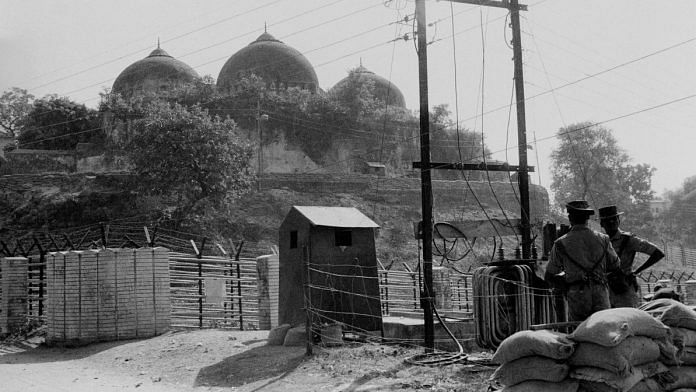 Dishonouring a pledge
Dishonouring a pledge
Faizan Mustafa | The writer is vice-chancellor, NALSAR University of Law, Hyderabad
The Indian Express
Mustafa comments on the violence taking place in Northeast Delhi and warns that the desecration of the Badi Masjid in Ashok Nagar is likely to haunt people as it “evoked memories of the demolition of the Babri Masjid on December 6, 1992.” He urges the Supreme Court and the government to act urgently and “restore confidence to ensure that minority rights do not remain on paper”.
 Understanding Budget policy
Understanding Budget policy
Arvind Subramanian | Former chief economic adviser, GoI
Josh Felman | Former IMF resident representative in India
Business Standard
Subramanian and Felman identify the Centre’s “three key objectives” with regard to economic policy — “advance the prime minister’s vision of New Welfarism”, “establish a reputation as fiscally conservative” and bond markets must not be rattled. However, since 2017-18, “Reality has not cooperated with the government’s plans” given that net tax revenues to the centre have “stagnated” and lack of transparency over revenue projections has created “uncertainty in the economy”.
 Spectacle and Substance
Spectacle and Substance
Navtej Sarna | The writer is former Ambassador of India to the US, UK and Israel
The Indian Express
Sarna criticises those commentators who claim that US President Donald Trump’s visit was all optics and no substance. He argues that optics play a role in high-level visits as leaders are human beings and appreciate a warm welcome. However, he states, “With a successful visit under the belt, attention must now turn to the substance”. He points at three areas where the relationship needs more substance — policies regarding foreign companies’ operations in India, energy trade and security.
 Disenchantment in Paris
Disenchantment in Paris
Kapil Komireddi | Author of Malevolent Republic: A Short History of the New India
The Indian Express
Komireddi comments on how French President Emmanuel Macron’s reforms in pension schemes in Franceseem to have backfired on him. Macron radically overhauled the post-war pension scheme, by merging existing private and public sector regimes in a universal point-based system, and early retirement privileges enjoyed by some workers will also end. Violent protests have followed this decision. Komireddi argues that one of the reasons why Macron came to power was because of his stance against the far-right in his election campaign of 2017, but since then his policies have “accelerated the disillusionment of the French electorate.”
 What India can learn from the US’s efforts to curb air pollution
What India can learn from the US’s efforts to curb air pollution
Kenneth I. Juster| US ambassador to India
Juster discusses how the US’ Clean Air Act of 1970, “which established nationwide monitoring and oversight” of national emissions, solved not just LA’s but the whole country’s problem of air pollution. India should take a leaf from this and its National Clean Air Programme shows that it is on the right track, he writes.
 The government may be faced with a big dilemma in 2020-21
The government may be faced with a big dilemma in 2020-21
Alok Sheel | RBI chair professor at ICRIER
Mint
Sheel raises concerns about the central government’s “pattern of receipts”. Given the backdrop of “falling growth”, Sheel suggests the government do one of two things for fiscal stimulus either “roll back its enhanced outlays on investment, or further cut back its reduced outlays on consumption”.
 Map out a better solution
Map out a better solution
Bibek Debroy | Chairman, Prime Minister’s Economic Advisory Council
Sajeesh Kumar | Director, Ministry of Railways
The Economic Time
Debroy and Kumar examine the formula used by the 15th Finance Commission report for a “horizontal distribution” of the share of taxes between states. They criticise the weightage given to “geographical area” in particular, given that states with “a large area and low density of population continue to incur heavy expenditure for providing basic administrative infrastructure.” They conclude that the discourse needs to move from “estimation of actual cost, beyond surrogate indicators like geographical area using existing tools”.
 Pandemics and the climate crisis
Pandemics and the climate crisis
Chandra Bhushan| CEO, iFOREST
The Financial Express
Even though there is no evidence of the connection between coronavirus and global warming, Bhushan points out that “a warming climate, along with a host of other factors, exacerbates the emergence of new infectious diseases”. Working on the climate crisis and antimicrobial resistance as a combined issue is key to containing new diseases and “safeguard[ing] our health”.
GST killing SMEs
Dripto Mukhopadhyay| Founder and CEO, ACRA
Sanjib Pohit | Professor, NCAER
The Financial Express
Mukhopadhyay and Pohit highlight different ways the current GST system puts small and medium businesses at a disadvantage. For example, they point out that nearly 60 per cent of compliance costs of GST fall on SMEs despite the fact that SMEs only “accrue the benefits of GST over a long period of time—and that, if they survive.”
Today’s Editorials
The Times of India:The involvement of National Security Advisor Ajit Doval to restore law and order in riot-hit Delhi poses grave questions to the Delhi Police, which reports to the Home Ministry, says TOI. Delhi Police failure to handle the situation is reminiscent of the 1984 riots. It is now time to enforce police reforms which ensure transparent and bipartisan oversight and free IPS officers from the grip of incompetent politicians, it suggests.
Hindustan Times: According to the World Air Quality Report, Delhi has the worst air among capitals of 98 countries. While air quality monitoring has begun under NCAP (National Clean Air Program), the data will remain unstable without a methodical system, notes HT. The cities should also begin reporting on their annual progress and therefore, there should be a method to track the progress to ensure that they are on the correct path for cleaner air, writes HT.
The Indian Express: The resolution passed in the Bihar assembly against NRC by the JD(U)-BJP government brings a “welcome touch of moderation”, writes Express. The daily suggests that the central government should take a cue from Bihar.



